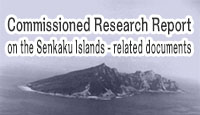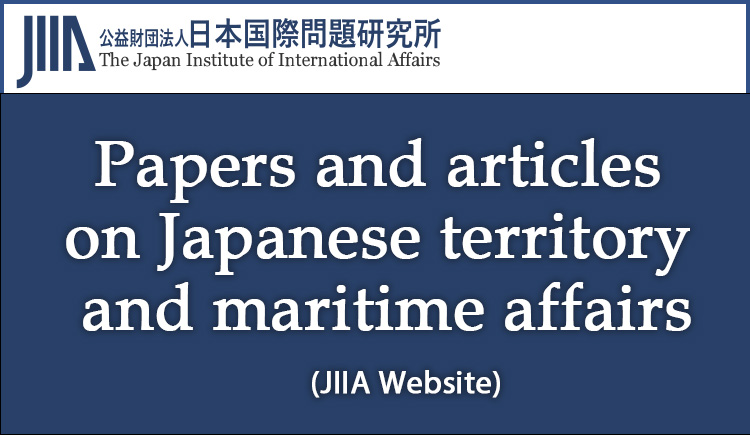The documents and materials published on this website were collected, researched, and prepared with advice from experts, as a part of a Government-commissioned project.
The contents of this website do not reflect the views of the Government.
Comprehensive issues
Column On the Expression of “Effective Control”
Masahiro Miyoshi (Professor Emeritus, Aichi University)
*Adobe Acrobat Reader DC, provided by Adobe, is needed to view the PDF files. If you do not have the software, please download it from the linked site. Adobe Acrobat Reader DC
Introduction
As people tend to say “South Korea effectively control Takeshima” or “China is seeking to effectively control the Senkaku Islands” in describing the situations surrounding Japan’s those island territories, the expression of “effective control” over a certain territory may appear to have taken root now. The phrase “effective control” which would have been first used by the media and then become widespread seems to mean either a state of virtual possession of (or control over) a certain territory or any act to aim at it by force, even in defiance of law and justice. This way of describing such a situation is easy to understand, and may not seem particularly problematic.
However, I feel like making a slight objection here from the perspective of international law. In the first place, South Korea’s assertion about Takeshima is merely meant to justify its own actions after a certain date, while no such territorial dispute as alleged by China exists over the Senkaku Islands since Japan has legitimately established and retained effective control over the islands under international law. The problem is that using the term “effective control” has a subtle nuance which may possibly be understood to endorse an attempt to create a state of virtual possession by using force at any cost and legitimize it as a fait accompli. For the correct description of the situation, therefore, the expression “an act to aim at virtual control” or the like should be used instead of “effective control”. For unknown reasons, international lawyers have refrained from speaking out on this issue.
1. The concept of effective control
Under modern international law the State’s ownership of, and sovereignty over, a certain territory means that “State authority has been displayed continuously without protest from foreign countries” in the territory. Numerous cases of territorial and boundary disputes between States before international tribunals show that the manner and degree of display of “State authority” vary from place to place. In the case of remote uninhabited islands, the State’s minimum required act to claim sovereignty over them was, for example, the erection of a pole with the State’s name marked on it. If the target place was inhabited, some administrative act by the State over the inhabitants (e.g. tax collection) would be considered sufficient. In polar regions with poor living conditions, national public facilities such as a meteorological observatory might be acceptable.
In a case where any State authority was not clearly displayed in a certain region, the fact that a population with the nationality of one of the parties was living there would seem to have been taken into consideration. This case, perhaps a rare exception, was the Argentina-Chile Boundary (Palena district) case of 1966. The case indicated that in view of the fact that there was a larger population of settlers having nationality of one party than the other in the border area, the convenience to their daily life appeared to be considered important1. In that case, or any other cases of disputed areas in different conditions for that matter, it can be said that both parties’ claims to sovereignty over the disputed areas are carefully weighed, and then the relatively weightier one will be recognized. In general, official State acts are to be evaluated, but the physical conditions which are absolutely required for territorial ownership are not clearly defined.
What has been said above is an abstract conceptualization of the matter. In practice it is important to discuss the background and circumstances of specific situations and then make an objective evaluation of their legal meanings. In other words, news reports should evaluate “effective control” over the territory in question in terms of international law, but in fact the reporting media mostly fails to do so. Since the matter concerns the State’s sovereignty over territory and its ownership, which constitutes the State’s very basis, we cannot afford to make light of the correct evaluation of the matter.
Note 1
Jennings, who served as counsel for Argentina in the arbitration, surmised to that effect in a paper he wrote some years later. Jennings, R. Y., “The Argentine-Chile Boundary Dispute – a case study”, International Disputes: The Legal Aspects (Report of a Study Group of the David Davies Memorial Institute of International Studies, London: Europa Publications, 1972), pp. 324-325. For details, see: Miyoshi, Masahiro, Considerations of Equity in the Settlement of Territorial and Boundary Disputes (Dordrecht/Boston/London: Martinus Nijhoff Publishers, 1993), pp. 159-162, 196-197.
2. Disputes and the critical date
Now some words must be said about the words “dispute” and “critical date”, for the matter of “effective control” becomes an issue of concern because there has arisen a dispute over territory between the countries concerned, and it must first be clarified when such a dispute began and how it has developed. Regarding disputes between States in a generic sense, the United Nations Charter distinguishes between “international friction,” “dispute,” and “situation” by exactly phrasing “any dispute, or any situation which might lead to international friction or give rise to a dispute” in Article 34. This suggests that when a “dispute” is referred to, it needs to be expressed with some caution.
Then, what state of affairs does the term “dispute” refer to? In the international jurisprudence, it has been explained as follows2:
A dispute is a disagreement on a point of law or fact, a conflict of legal views or of interests between two persons;
or otherwise,
Whether there exists an international dispute is a matter for objective determination. The mere denial of the existence of a dispute does not prove its non-existence. (…) There has thus arisen a situation in which the two sides hold clearly opposite views concerning the question of the performance or non-performance of certain treaty obligations. Confronted with such a situation, the Court must conclude that international disputes have arisen.
In short, it is assumed that “when the parties disagree in their views or interests, with such disagreement taking the form of a clear and objective conflict of legal views, there is a ‘dispute’”. Conversely, a conflict in which there is no objectively clear conflict of legal views is not to be considered a “dispute” before international tribunals.
What comes up next is the temporal factor of when such a “dispute” arose. A conflict over territory between States often lasts for a long period of time, during which there would have been some communications exchanged between the parties, accordingly allowing some legal points of contention to emerge through this process. If such a conflict is brought before an international tribunal, the tribunal sorts out the contentions of both parties to determine the existence of a “dispute” and the time when it started, thus designating this time as the “critical date.” What is important in this connection is that the defined acts of the parties carried out up to this designated time are recognized as acts to be taken into account or positive achievements, as it were, while those acts which were performed after this date are not to be considered. Precisely, only those State acts for consideration are defined as “effective control.” The competent tribunal compares the extent of “effective control” by the parties, determines that the party having a firmer control over the disputed territory has an advantage, and grants territorial rights to that party.
Thus, any acts after this “critical date” will not be considered and recognized by the tribunal even if the party claims that they constitute acts of “effective control.” To put it simply, post-critical date acts would virtually count for nothing. This handling of the matter should be considered reasonable; should acts after the “critical date” be counted in, repeated attempts unashamedly trying to build up their alleged accomplishments to their own advantage may unnecessarily harm the order of relations between the disputing parties and undermine the law and order of general international relations, thereby violating the principle of fairness. However, such an evaluation can only be done objectively by an international tribunal as a third-party; the parties to the dispute do not necessarily act with the right “critical date” in mind. Yet in some cases, the parties may possibly anticipate a “critical date” to some extent for themselves, and attempt to make their alleged buildups for that purpose. That is exactly how a situation can get inextricably tangled up, and makes it logically significant for an international tribunal to intervene as a neutral third-party.
For the sake of accuracy, let us pause now to look into the arguments about the “dispute” and “critical date” discussed in the 1953 judgment of the International Court of Justice in the Minquiers and Ecrehos case (France v. United Kingdom). In this case, both parties made detailed allegations of their own acts they considered to be effective in the islands of the Minquiers and Ecrehos off the Golfe de Saint-Malo in the English Channel in order to set the “critical date” in their favor and secure sovereignty over these islands. France argued that the date of the Fishery Convention of 1839 between the United Kingdom and France should be considered as the critical date, subsequent to which acts performed by each party cannot be set up against the other as manifestations of territorial sovereignty. On the other hand, the United Kingdom contended that the year 1950 when the two countries agreed to bring the present case to the International Court of Justice should be selected as the critical date, thus allowing the facts to that date to be taken into consideration. Both parties, especially the U.K., developed their contentions in terms of the critical date in great detail, but the Court did not discuss them so much and made its decision by summarizing the arguments of both parties as follows:
The United Kingdom Government submits that, though the Parties have for a long time disagreed as to the sovereignty over the two groups, the dispute did not become “crystallized” before the conclusion of the Special Agreement of December 29th, 1950, and that therefore this date should be considered as the critical date, with the result that all acts before that date must be taken into consideration by the Court. The French Government, on the other hand, contends that the date of the Convention of 1839 should be selected as the critical date, and that all subsequent acts must be excluded from consideration.
And it continued, concluding as follows:
At the date of the Convention of 1839, no dispute as to the sovereignty over the Ecrehos and Minquiers groups had yet arisen. The Parties had for a considerable time been in disagreement with regard to the exclusive right to fish oysters, but they did not link that question to the question of sovereignty over the Ecrehos and the Minquiers. In such circumstances there is no reason why the conclusion of that Convention should have any effect on the question of allowing or ruling out evidence relating to sovereignty. A dispute as to sovereignty over the groups did not arise before the years 1886 (for the Ecrehos; added by the author) and 1888 (for the Minquiers; added by the author), when France for the first time claimed sovereignty over the Ecrehos and the Minquiers respectively. But in view of the special circumstances of the present case, subsequent acts should also be considered by the Court, unless the measure in question was taken with a view to improving the legal position of the Party concerned. In many respects activity in regard to these groups had developed gradually long before the dispute as to sovereignty arose, and it has since continued without interruption and in a similar manner. In such circumstances there would be no justification for ruling out all events which during this continued development occurred after the years 1886 and 1888 respectively.”3 (Underlined by the author)
The Court analyzed the aspects of conflict between the two Parties, identifying the date when their acts based on a sense of sovereignty over the territories in question ran against each other, and determined that a “dispute” had arisen in 1886 for the Ecrehos and in 1888 for the Minquiers. Thus, the Court found those years the “critical date” for the dispute. However, in view of the “special circumstances” of the present case, it also decided to take into consideration all the British acts up to the time of the Agreement of 1950 to bring the case before the Court, because those activities which had continued in the islands subsequently to the above critical date were not conducted with a “view to improving the legal position” of the British Government.
As seen above, the basic meaning of “effective control” based on international judicial precedents is a “legitimate effective control,” and is a matter that should be determined objectively and carefully. In this understanding of the matter, one cannot help saying that the phrase “effective control” as commonly used is somewhat coarse, merely referring to as rough a state of affairs.
Note 2
For the former quote, see the Affaires des Concessions Mavromatis en Palestine (Exception d’incompétence) case of 1924, PCIJ Publications, Series A, No. 2, p. 11. For the latter quote, see the Interprétation des Traités de Paix Conclus avec la Bulgarie, la Hongrie et la Roumanie case of 1950, ICJ Reports 1950, p. 74.
Note 3
The Minquiers et Ecréhos case, Judgment of 17 November 1953, ICJ Reports 1953, pp. 59, 59-60.
Senkaku Islands
Research and Commentary Site
- I Comprehensive issues
- II Commentary on themes by historical period
- III Analysis of claims by other countries





